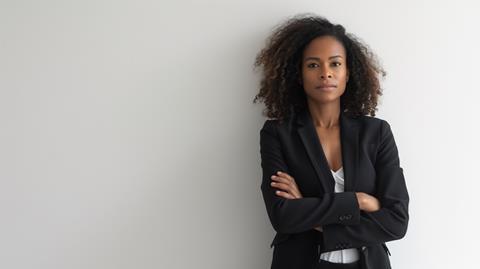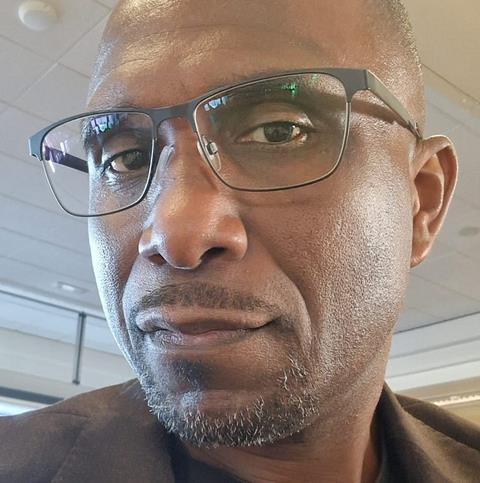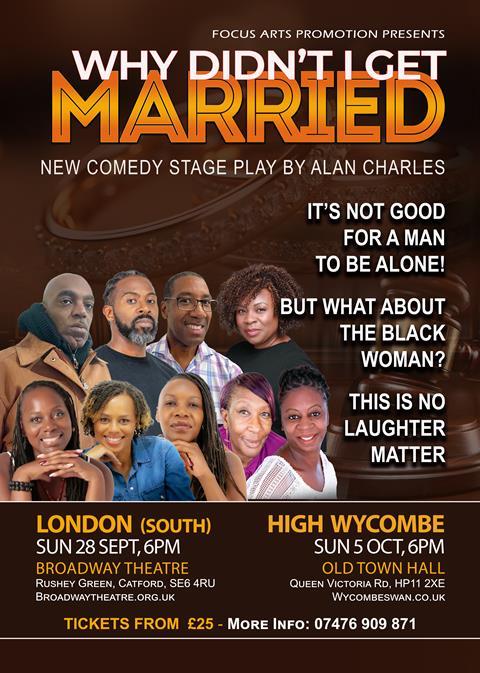Many Black Christian women are praying for Christian husbands who, statistically speaking, will never arrive. And the Church is partly to blame. That’s the controversial idea at the heart of Alan Charles’ new play Why Didn’t I Get Married? Sam Hailes spoke to him to find out more

For every seven women in church, there’s only one man.
That’s according to playwright Alan Charles, who says single Christian women who want to be married to a fellow believer are being put in an impossible position. Many are told to wait and pray, but statistically speaking, when it comes to finding lasting love, they’re at a significant disadvantage.
The “7:1 dilemma” is a common but rarely discussed phenomenon, says Charles. His latest production Why Didn’t I get Married? promises to “rip the bandage off a long-simmering wound in the Black Christian community”.
The plot centres around a bold legal move: a group of single Black Christian women file a class action lawsuit against the Church. Their charge? Emotional and psychological trauma caused by involuntary singlehood—something they say is partly due to the church’s failure to support realistic relationship outcomes.
It’s been billed as a “gripping semi-courtroom drama” where the church is called to the stand and the audience becomes the jury. I spoke to him to find out more ahead of the play’s arrival in London and High Wycombe later this month.
Where did the idea for the play come from?
In 2020, a book was written called Black Single Christian featuring 13 different contributors. One of the writers said that she’s angry at the Black Church because the Church sold them a lie.
The lie was that if you become the Proverbs 31 wife, keep yourself pure, pray, fast, stay in church, don’t get involved with anybody outside the church, then your Boaz will come along. This writer was now in their late 50s - no Boaz, no husband, no children. Yet their friends who left the church got married and had kids.
The writer said she was angry at the Church for failing to provide sufficient men for them to get married, because the ratio of men to women, especially amongst the Afro-Caribbean churches, is seven women to one man. The Church should have done more to get more men in, and, importantly, to empower the men so that they can be suitable husbands. Because even the few men that are in Church are not marriage material - financially, emotionally or spiritually.

How did you go from reading that book to writing a play?
The author had posted their book extract on Facebook, and it resulted in a big debate. There was a controversial US psychologist in the comments arguing that keeping Black women single is a deliberate decision, because it serves the purpose of the church. Black women are more educated than Black men. They earn more money and they’ve got more time and resources for the church when they’re single. Once they get married, they have less time and resources. So the church intentionally keeps itself feminine and does not attract men, because they want to keep women single. I’m like, hang on a minute! Is the church really somehow responsible for this?
It’s from that I wrote Why Didn’t I Get Married? which asks if we should hold the church responsible for the high levels of singleness. The play is a courtroom drama where we are asking the questions and putting all of the arguments out there.
Have your personal views on this subject changed as a result of writing the play?
Definitely, because I had to do my research. I jumped at it with full speed, but then I realised, no this is a very delicate topic, I have to make sure what I’m saying is truthful and honest. I spoke to a lot of single people to get their ideas and to see if they agree that the church should be held accountable.
This play promises to put the church on trial. What would you say to people who are uncomfortable with that idea?
Yes it gets people’s backs up because they think I’m trying to persecute or blame the church. When we hear the term the “church on trial”, we normally think of the church being the pastor or leader. But actually, we are all the church.
It’s not us verses them. If the church is guilty, then we’re all guilty. If the church is innocent, then we’re all innocent.
The Church should be a family - we should each be asking, what are we doing to solve the problem as a family together? If the church is a hospital, then what are we doing as doctors and nurses to bring healing?
I hear what you’re saying - that it’s all our responsibility. Nevertheless, is there anything in particular that church leaders could or should be doing?
When I was talking to men who don’t go to church, they explain that the church is not relevant to them. The way we do church seems to have a more feminine approach. So the first thing we need to do is to create an atmosphere that’s attractive to men, so men can come and feel comfortable. Once they’re there, then we can empower them and show them how to be an Ephesians 5 man to compliment the Proverbs 31 woman.

And we need to mingle and meet each other in a safe space where the married folk can mentor the single folks and the older women can speak to the young girls and share their experience about marriage - the good, the bad and the ugly. Because in the Church we have a habit of trying to pretty everything. The more truthful we are about our real issues in our marriages, the better we’ll be all around.
Is the play designed to be a conversation starter to put this on the agenda in more churches?
Definitely. We actually do seminars where we go to churches, show clips from the play and we have the conversation. And you’d be surprised that the pastors and the leaders are often unaware of what’s going on among their congregation. They’re hearing stuff for the first time that they didn’t realise. We create a safe space where people are talking - they’re sharing their pain and then it’s for the church to see what they can do going forwards to bring comfort and remedy to people who are broken and hurting.
Why Didn’t I Get Married? is showing in London, High Wycombe, Luton and Birmingham this autumn. For more information call 07476 909 871





































1 Reader's comment